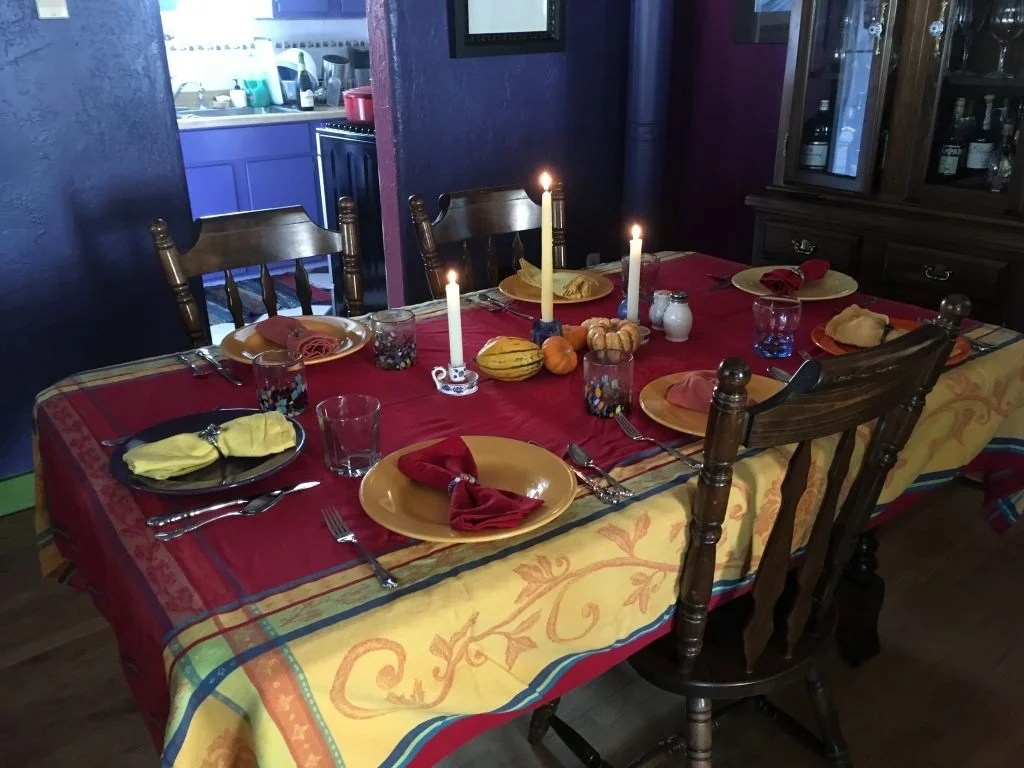Holiday Practices
Some years ago Matt interrupted my early morning reading over a cup of coffee to talk to me about turkeys.
He had just read an article in the New York Times about Greenberg Smoked Turkeys, an outfit in Tyler, Texas where one could order a turkey (kosher, no less!) and have it delivered to one’s doorstep in time for Thanksgiving. “Let’s do it,” Matt said.
While Thanksgiving has long been my favorite holiday, we have never had sacred traditions around the day. Some years we have been with family or friends. Twice we have traveled San Francisco. Once we were snowed in a farmhouse in New Hampshire. Some of our favorite Thanksgivings have been spent alone: we would roast a chicken, drink a bottle of champagne and stay in our pajamas all day watching movies.
I was game for the novelty of a smoked turkey being delivered by UPS. And thus a tradition was born.
There is no time like the holidays to remind us that we all have practices we cherish. We light candles and bake pies. We give up chocolate and dye Easter eggs. We sing carols and string lights around our houses. Holiday traditions are sacred practices.
Even the piano studio has certain holiday-related practices. We spend the weeks before Halloween creating spooky compositions using the “silent key effect” where we depress a handful of keys without making a sound, and then improvise freely with the other hand, creating a ghostly effect. The week after Halloween signals the time that books of Christmas music appear in the sight-reading library (“Woo-hoo!” say some students. “Already?” groan others.). “Do you have any Thanksgiving music?” a little one asked me last week. “Nope,” I said. “Want to write some Thanksgiving-themed music?” He nodded, although he seemed doubtful about a tune based on mashed potatoes and cranberry relish.
Our fall recital is always held the Saturday before Thanksgiving, allowing us the freedom of consuming mountains of mashed potatoes and pumpkin pie without the distraction of our recital pieces. This also means that for the remaining few weeks of the semester, when a small child says, “Miss Amy, can I please play ‘Jingle Bells’?” I can say, Why not? And how about “Up on the Housetop” too?
I spent much of last week in full Thanksgiving practice mode. There were recital photos to post and videos to distribute, a sticky punch bowl to wash and programs to file and recycle. While I think I have figured out the art of having 25 kids ready to perform on exactly the same day at exactly the same hour, it still feels like I have to depend upon a bit of sorcerer’s magic to pull it off every semester. No matter how many pedagogical skills I acquire (If I assign little ones a big kid buddy, the big kids can help little ones know when it’s their turn and move the bench into the right spot.), or how much time and thought I give to recital preparation (If, in the weeks prior, every kid performs their piece for the student right before and after their lesson, they get that many more “performance runs.”), I always secretly fear that this will be the time the magic will fail me and everyone will find out: maybe I don’t know what I’m doing after all. But Saturday night went well, the photos are all smiles, the videos show strong performances. In lessons, we can now move from polishing and rehearsing recital pieces, to learning new things: primary chord progressions in inversion, melodic minor scales, a Bach invention or a new tricky Kabalevsky piece. We can practice to forge new ground instead of merely raking over familiar territory. Good stuff.
Most of last week, I wasn’t thinking about teaching at all. I planted 200 tulip bulbs. Matt and I went to movies and took naps on the couch and squandered entire afternoons reading mysteries. I went hiking with a visiting friend. I strung twinkling white lights around the front door and draped the mantel with dried cranberries woven with more white lights. I set paper white bulbs in bowls of glass pebbles and placed them in sunny windows all around the house. I pulled out the Christmas pop-up books from the box in the basement. There was smoked turkey and piles of mashed potatoes for days. And pie. Lots of pie.
Much of the time practicing feels solitary, the small daily routines and rituals of musicians seem old school, ancient in the face of our instant gratification and frantic culture. For once, however, the idea of practice is not counter-cultural, because from now until the end of the year, the world around us is practicing its traditions and rituals too: sending holiday cards and baking fudge, caroling at nursing homes and hospitals, buying toys for children in need and loved ones, attending midnight services and lighting luminaries. These practices may be annual rather than daily, but they are sacred practices nonetheless. I can’t help smiling when folks tell me how much they avoided practicing the piano as a child, but as adults they have adopted elaborate holiday rituals they hold dear. “Sure, you hate practicing,” I think, never letting them in on the secret: We all practice.
For the next month in the studio, we will be picking out Christmas tunes by ear to harmonize, sight reading Nutcracker dances, learning “Carol of the Bells,” practicing downward scales to the rhythm of “Joy to the World.” Every night, I will turn on the cranberry lights on the mantle when I pull the curtains shut during my evening lessons. Outside, the white lights twinkle around the front door, the tulips bulbs sleep in the garden, there are eighteen candles burning in the fireplace.
Practices all.
